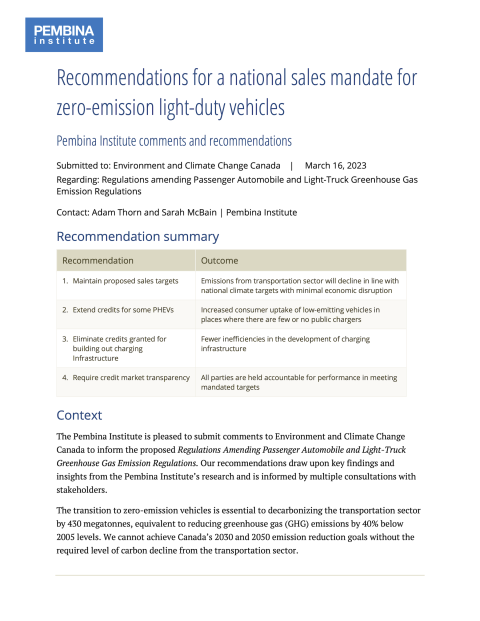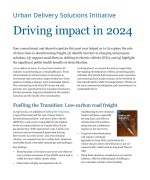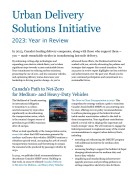The Pembina Institute submitted four key recommendations to Environment and Climate Change Canada in response to the federal government’s proposed Regulations amending Passenger Automobile and Light-Truck Greenhouse Gas Emission Regulations under the Canadian Environmental Protection Act.
The regulations are also referred to as the “sales mandate for zero-emission light-duty vehicles.” As per the targets listed in the 2030 Emissions Reduction Plan, released in March 2022, the federal government posted draft regulations that will require 60 per cent of new light-duty vehicle sales be zero-emission vehicles (ZEVs) by 2030, increasing to 100 per cent of sales by 2035. We strongly support these targets and the overall design of the proposed zero-emission vehicle sales mandate and urge the federal government to finalize its regulation in fall 2023.
Transportation accounts for nearly a quarter of Canada’s greenhouse gas emissions, making the sector the second-largest source of overall emissions following oil and gas. Emissions from passenger trucks, vans and SUVs more than doubled between 1990 and 2020, a worrisome upward trajectory that conflicts with Canada’s stated goal of a 40 per cent to 45 per cent decline in emissions by 2030 and net-zero emissions by 2050.
Unless the federal government enacts climate policies that will hasten the transition from gas to electricity in the transportation sector, Canada will not achieve its’ climate commitments.
Our recommendations are as follows:
1. Maintain (or increase) the proposed ZEV sales targets
While the Pembina Institute recommends that the proposed targets for ZEV sales be maintained in the final regulations, increasing those targets to harmonize with other North American jurisdictions would likely provide benefits to consumers and suppliers alike. Conversely, diluting the targets risks undermining the effectiveness of the regulation.
2. Increase credits for some plug-in hybrid vehicles
The Pembina Institute recommends that support for Plug-in Hybrid Vehicles (PHEVs), especially mid- and longer-range PHEVs, be maintained in the sales mandate. We further recommend increasing partial credits to .75 until 2030 for PHEVs with a range between 50km and 79km and offering a full credit for PHEVs with more than 80km of range.
3. Eliminate credits for infrastructure
The Pembina Institute recommends eliminating credit eligibility for ZEV related activities. In all likelihood, a sales mandate will motivate private investment in infrastructure as the financial community can have confidence in a growing customer base as more EVs come on the road.
4. Require credit market transparency
The Pembina Institute supports a system of credit trading between automakers but recommends that the market be transparent and include yearly reporting of credit trading activity. Credit market transparency is critical to assuring there is public accountability.








